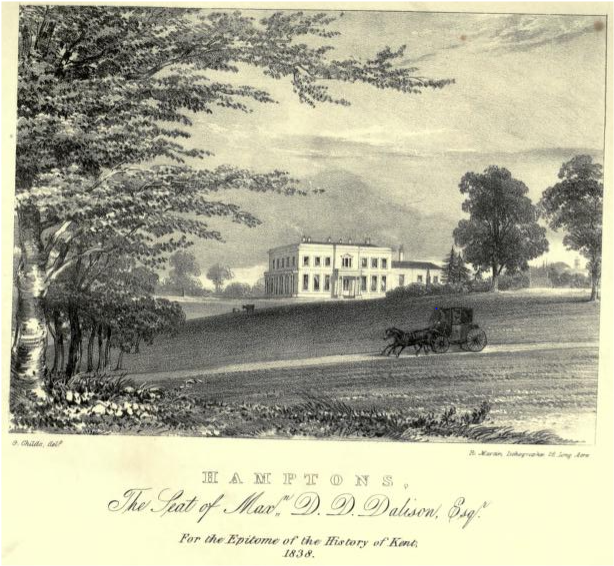MRP: The Hamptons
Thomas Stanley & Maximilian Dallison house, The Hamptons, West Peckham, Kent
Editorial history
26/08/11, CSG: Created page
THIS ENTRY REQUIRES EDITING
Contents
Suggested links
See biographical profile of Thomas Stanley
See biographical profile of Maximilian Dallison
See profile of Bishop's Palace (the Dallison family estate)
To do
Images
Hamptons, built 1820, seat of Maximilian D.D. Dalison Esq, Greenwood, 1838
Image credits & copyright information
Greenwood, C., The epitome of county history, vol. 1, Kent (London, 1839), plate, betw. pp. 140 & 141
- Out of copyright book and image
- Sources from an Internet Archive edition
Profile
Sixteenth century building
The sixteenth century house and estate of the Hamptons was located in West Peckham in Kent. It was leased by Thomas Stanley to Elizabeth Dalyson, following the signing of a marriage contract between his daughter, Frances, and Elizabeth's son, Maximilian.[1] The property had come into the Stanley family through the marriage of Thomas' father, XXXX Stanley, to XXXX of the Hamptons, Kent.[2] Nothing is known of the building history.
Edward Hasted wrote in 1798:
The seat of Hamptons, now almost in ruins, stands near the east side of this stream, in a wild gloomy situation, and at a small distance, that of Oxenhoath, an antient brick building, situated on a rise of ground, having a most extensive prospect over the Weald, and again to the hills north-eastward, the ground about it is finely wooded, and is the greatest part of it exceeding rich pasture.[3]
According to Felix Hull, the original Hamptons was destroyed by fire in 1883.[4] Another building, also titled Hamptons in West Peckham has been listed by English Heritage as Grade II. The listing states that this house was being built in 1813.[5]
No surviving image or plan of the original house has been found.
1820 building
An engraving of the Hamptons as erected (it is stated) in 1820, and dated 1838, was published by C. Greenwood in 1839.
Hamptons, in the Parish of West Peckham, the seat of Maximilian Dudley Digges Dalison, Esq., a Magistrate and Deputy Lieutenant for the County, and Major in the West Kent Militia, is an elegant modern structure, erected in 1820, of pale brick, with beautifully modelled freestone facings. the portico to the principal entrance is built entirely of stone, and is supported by four Ionie columns. The conservatory, shubberies, and plantations add their respective beauties to the general effect of this delightful place....
Hamptons commands extensive prospects over the southern part of the county. It is distant from Tunbridge nearly five miles, from Maidstone about nine miles, and from London 30 miles.[6]
Notes
Possible primary sources
Greenwood, C. The epitome of county history, vol. 1, Kent (London, 1839)
Hasted, Edward : 'Parishes: West Peckham', The History and Topographical Survey of the County of Kent, vol. 5 (London, 1798), pp. 56-70
Hull, Felix, Guide to the Kent archives (XXXX, 1958), p. 174
'Letters of Thomas Stanley of Hamptons' in Archaeologia Cantiana, vol. 17 (London, 1887)
- English heritage listing: the Hamptons- ↑ This is the footnote text
- ↑ This is the footnote text
- ↑ Edward Hasted, 'Parishes: West Peckham', The History and Topographical Survey of the County of Kent, vol. 5 (London, 1798), pp. 56-70
- ↑ Felix Hull, Guide to the Kent archives (XXXX, 1958), p. 174
- ↑ http://www.britishlistedbuildings.co.uk/en-178964-hamptons-west-peckham - English heritage listing: the Hamptons
- ↑ C. Greenwood, The epitome of county history, vol. 1, Kent (London, 1839), p. 140
